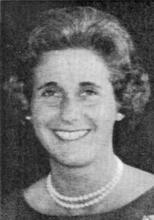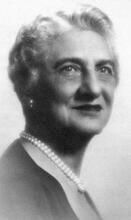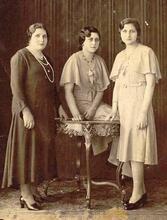Elsie Margaret Binger Naumburg
Elsie Naumburg studied zoology at the universities and museums of Frankfurt-am-Main and Munich. She returned to New York in 1916 and began volunteering in the American Museum of Natural History’s department of ornithology, becoming a staff member in 1918, research associate in 1923, and associate benefactor in 1930. She focused her attentions on the little-studied birds collected during Theodore Roosevelt’s expedition to Brazil and funded a further expedition by Emil Kaempfer from 1926–1931. She wrote several major works on the birds themselves. From 1942 to 1948 she was director of the National Audubon Society. In WWII, she stopped her work to focus on relief projects for musicians. She chaired the board of An Hour of Music, which offered promising performers a New York debut, and served as secretary and treasurer of her husband’s foundation to support musicians and composers.
Early Life and Education
Elsie M.B. Naumburg successfully combined a career in science and active participation in philanthropies, gaining the respect and affection of her many friends and colleagues. Born July 7, 1880, in New York City and educated in private schools, she was the daughter of Frances (Newgass) Binger and Gustav Binger, a wealthy German industrialist who came to New York in 1867. She had three brothers: Robert, Walter D., and Carl. In 1908, she married Victor Reichenberger.
Naumburg traveled to Germany in 1912 to study at the universities of Frankfurt-am-Main and Munich. She began her museum studies at the Senckenberg Museum in Frankfurt and subsequently at the Zoologische Staatsmuseum in Munich.
Ornithologist
Victor Reichenberger died in 1913, and Naumburg returned to New York in 1916, as the United States was about to enter World War I. Soon thereafter, she volunteered in the Department of Ornithology at the American Museum of Natural History, becoming a staff member in 1918, a research associate in 1923, and an associate benefactor in 1930. In 1923, she married Walter Wehle Naumburg, an amateur cellist and a member of a prominent New York family. They made their home in New York and New Caanan, Connecticut.
Somewhat earlier she had begun studying the birds collected on the Theodore Roosevelt–Colonel Candido Rondon expedition to Brazil, the famous River of Doubt expedition. This enormous task was completed in 1930, and the publication “The Birds of Matto Grosso, Brazil,&rdquo is still a classic.
Her deep interest in the poorly known South American avifauna led her to support fieldwork by Emil Kaempfer in eastern Brazil and Paraguay from 1926 to 1931. After beginning her study of this collection, she found it essential to pinpoint the remote collecting localities, many of which did not appear on available maps. Taking a year off from her ornithological studies, she worked at the American Geographical Society, producing a still-useful gazetteer. She was named a fellow of the Society.
Aiding Musicians
Naumburg published several papers in a planned series to cover the entire Kaempfer collection. However, bowing to the humanitarian demands brought about by the outbreak of World War II, she gave up her own research to devote more time to relief projects, especially the Soldiers’ Canteen operated by the Salvation Army. Its activities centered around helping refugee and unemployed musicians during wartime.
In 1946, Naumburg established the Frank M. Chapman Memorial Fund at the American Museum of Natural History in honor of her mentor. It is now a major supporter of field and museum studies of birds worldwide, reflecting Chapman’s broad interests and pioneering studies of bird distribution and diversity.
Naumburg became secretary and treasurer of the Walter W. Naumburg Foundation, founded by her husband in 1925 to support composers and musicians. In addition, she was chair of the board of An Hour of Music, Inc., established in 1937 to provide promising performers with a professional debut in New York. She was also a fellow of the New York Academy of Science and of the American Ornithologists’ Union and director (1942–1948) of the National Audubon Society.
Later Life
Elsie Naumburg was active in several educational projects for children. She was a founder and trustee of the William T. Hornaday Memorial Foundation, established to promote children’s museums, and a director of the Greenwich (Connecticut) Nature Center.
Elsie Margaret Binger Naumburg died on November 25, 1953, in New York City.
Selected Works by Elsie M. B. Naumburg
“Animal ‘Building’: A Visit Behind the Scenes at the American Museum Where You May See Animals Being Made Ready for Exhibition.” The Junior Natural History 1, no. 11 (1937): 13–16.
“The Bird Fauna of North America in Relation to Its Distribution in South America.” The Auk 43 (1926):485–492.
“The Birds of Matto Grosso, Brazil: A Report on the Birds Secured by the Roosevelt Rondon Expedition.” Bulletin of the American Museum of Natural History 60 (1930): 1–432.
“Descriptions of Proposed New Birds from Brazil and Paraguay,” with George K. Cherrie. American Museum Novitates, no. 58 (1923): 8 pp.
“Descriptions of Proposed New Birds From Brazil, Paraguay, and Argentina,” with George K. Cherrie. American Museum Novitates, no. 27 (1921).
“Gazetteer and Maps Showing Collecting Stations Visited by Emil Kaempfer in Eastern Brazil and Paraguay.” Bulletin of the American Museum of Natural History 68 (1935): 449–469.
“The Senckenberg Museum, Frankfort-on-Main, Germany.” The Auk 48 (1931): 379–384.
“Studies of Birds from Eastern Brazil and Paraguay, Based on a Collection Made by Emil Kaempfer.” Bulletin of the American Museum of Natural History 74 (1937): 139–205, and 76 (1939): 231–276.
“Three New Birds from Northwestern [=Northeastern] Brazil.” American Museum Novitates, no. 554 (1932).


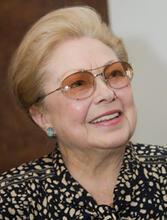


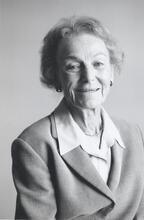
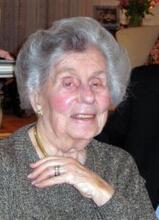
![roisman.jpg - still image [media] roisman.jpg - still image [media]](/sites/default/files/styles/medium/public/mediaobjects/roisman.jpg?itok=7iKIF0ev)
